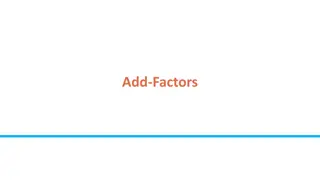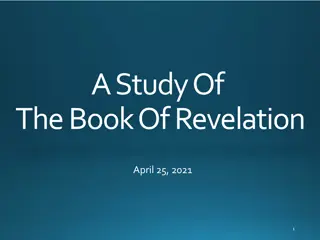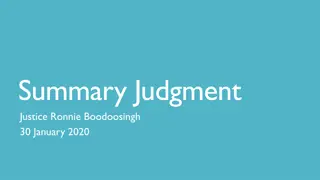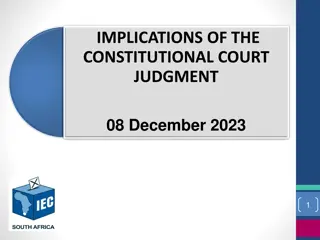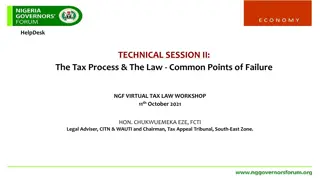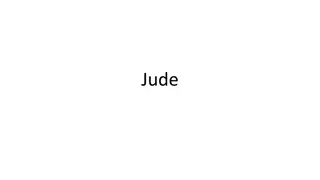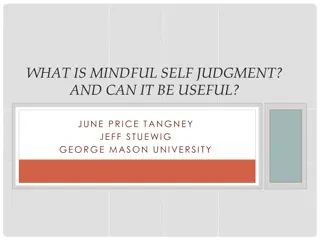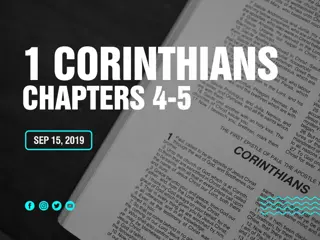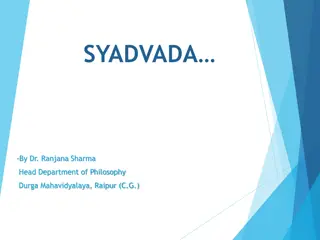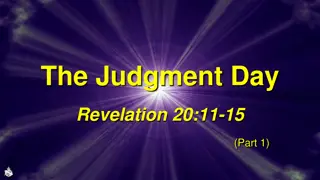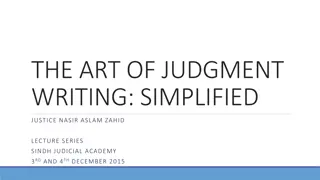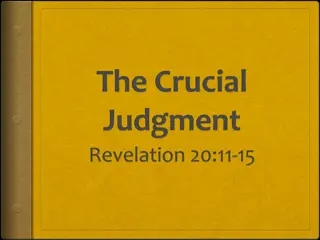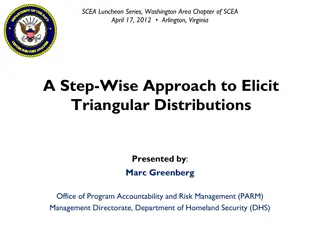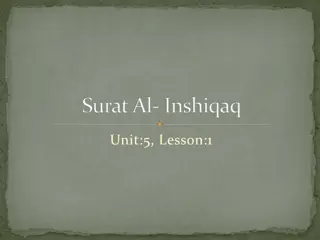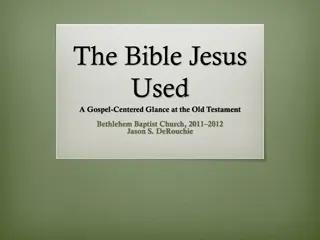
Understanding Legal Judgments and Delivery Processes in Court Proceedings
Learn about the meaning of judgments, modes of delivering judgments, language requirements, contents of judgments, alteration limitations, and more in the context of legal proceedings. Explore the formal decisions made by courts following legal processes and the significance of judgment delivery methods.
Download Presentation

Please find below an Image/Link to download the presentation.
The content on the website is provided AS IS for your information and personal use only. It may not be sold, licensed, or shared on other websites without obtaining consent from the author. If you encounter any issues during the download, it is possible that the publisher has removed the file from their server.
You are allowed to download the files provided on this website for personal or commercial use, subject to the condition that they are used lawfully. All files are the property of their respective owners.
The content on the website is provided AS IS for your information and personal use only. It may not be sold, licensed, or shared on other websites without obtaining consent from the author.
E N D
Presentation Transcript
JUDGMENT MEANING OF JUDGMENT MODE OF DELIVERING JUDGMENT LANGUAGE OF JUDGMENT CONTENTS OF JUDGMENT ALTERATION OF JUDGMENT SUBMISSION OF DEATH SENTENCE FURTHER INQUIRY OR ADDITIONAL EVIDENCE ORDER TO PAY EXPENSES OR COMPENSATION ORDER TO CERTAIN FEES IN NON-COGNIZABLE CASES
MEANING OF JUDGMENT A JUDGMENT IS THE FORMAL DECISION MADE BY A COURT FOLLOWING LEGAL PROCEEDINGS MOZAHER SIKDAR V STATE 35 DLR JUDGMENT MEANS ONLY JUDGMENT OF CONVICTION OR ACQUITTAL, BUT NOT AN ORDER OF DISCHARGE U/S 241A
S. 366-MODE OF DELIVERING JUDGMENT S. 366(1)- 1) The judgment in every trial in any Criminal Court of original jurisdiction shall be pronounced, or the substance of such judgment shall be explained- (a) in open Court either immediately after the termination of the trial or at some subsequent time of which notice shall be given to the parties or their pleaders, and (b) in the language of the Court, or in some other language which the accused or his pleader understands: Provided that the whole judgment shall be read out by the presiding Judge, if he is requested so to do either by the prosecution or the defence. S. 366(2)- The accused shall, if in custody, be brought up, or, if not in custody, be required by the Court to attend, to hear judgment delivered, except where his personal attendance during the trial has been dispensed with and the sentence is one of fine only or he is acquitted, in either of which cases it may be delivered in the presence of his pleader. S. 366(3)- (3) No judgment delivered by any Criminal Court shall be deemed to be invalid by reason only of the absence of any party or his pleader on the day or from the place notified for the delivery thereof, or of any omission to serve, or defect in serving, on the parties of their pleaders, or any of them, the notice of such day and place.
367.(1)- LANGUAGE OF JUDGMENT Every such judgment shall, except as otherwise expressly provided by this Code, be written by the presiding officer of the Court or form the dictation of such presiding officer in the language of the Court, or in English
S.367(1 & 2)- CONTENTS OF JUDGMENT POINTS FOR DETERMINATION, REASONS FOR THE DECISIONS OFFENCE AND SECTION OF LAW PUNISHMENT OFFENCES IN CASE OF ACQUITTAL SIGNATURE OF THE PRESIDING OFFICER
S.369-ALTERATION OF JUDGMENT NO ALTERATION OR REVIEW EXCEPTION CORRECTION FOR CLERICAL ERROR
S.375-SUBMISSION OF DEATH SENTENCE IN DEATH SENTENCE CONFIRMATION FROM HD STATE VS TUKU BISWAS 13 BLD HD CAN ACT SUO MOTO S.376-Power of High Court Division to confirm sentence or annul conviction S.377- Confirmation of new sentence to be signed by two Judges S.378- Procedure in case of difference of opinion S.379- Procedure in cases submitted to High Court Division for confirmation
S.375-FURTHER INQUIRY OR ADDITIONAL EVIDENCE HD CAN MAKE OR DIRECT FUTHEER INQUIRY OR ADDITIONAL EVIDENCE BE TAKEN PRESENCE OF ACCUSED MAY BE DISPENSED WITH THE RESULT OF INQUIRY AND EVIDENCE SUBMITTED TO HD WHEN DIRECTED
S.545(1)- ORDER TO PAY EXPENSES OR COMPENSATION IN DEFRAYING EXPENSES PROPERLY INCURRED IN THE PROSECUTION; IN THE PAYMENT TO ANY PERSON OF COMPENSATION FOR ANY LOSS OR INJURY CAUSED BY THE OFFENCE, WHEN SUBSTANTIAL COMPENSATION IS, IN THE OPINION OF THE COURT, RECOVERABLE BY SUCH PERSON IN A CIVIL COURT; WHEN ANY PERSON IS CONVICTED OF ANY OFFENCE WHICH INCLUDES THEFT, CRIMINAL MISAPPROPRIATION, CRIMINAL BREACH OF TRUST, OR CHEATING, OR OF HAVING DISHONESTLY RECEIVED OR RETAINED, OR OF HAVING VOLUNTARILY ASSISTED IN DISPOSING OF, STOLEN PROPERTY KNOWING OR HAVING REASON TO BELIEVE THE SAME TO BE STOLEN, IN COMPENSATING ANY BONA FIDE PURCHASER, OF SUCH PROPERTY FOR THE LOSS OF THE SAME IF SUCH PROPERTY IS RESTORED TO THE POSSESSION OF THE PERSON ENTITLED THERETO. IF THE FINE IS IMPOSED IN A CASE WHICH IS SUBJECT TO APPEAL, NO SUCH PAYMENT SHALL BE MADE BEFORE THE PERIOD ALLOWED FOR PRESENTING THE APPEAL HAS ELAPSED, OR, IF AN APPEAL BE PRESENTED, BEFORE THE DECISION OF THE APPEAL.
S.546AORDER TO CERTAIN FEES IN NON-COGNIZABLE CASE THE FEE (IF ANY) PAID ON THE PETITION OF COMPLIANT OR FOR THE EXAMINATION OF THE COMPLAINANT, AND ANY FEES PAID BY THE COMPLAINANT FOR SERVING PROCESSES ON HIS WITNESSES OR ON THE ACCUSED, AND MAY FURTHER ORDER THAT, IN DEFAULT OF PAYMENT, THE ACCUSED SHALL SUFFER SIMPLE IMPRISONMENT FOR A PERIOD NOT EXCEEDING THIRTY DAYS.

